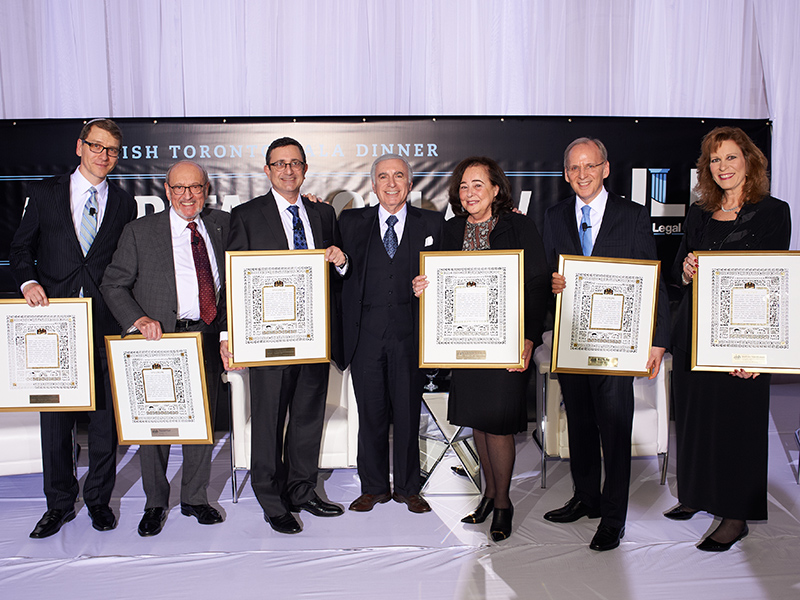As keynote speaker at Aish Toronto’s gala dinner last week, Irwin Cotler – professor of law, former minister of justice and attorney general of Canada, and the Law Society of Upper Canada’s first-ever Human Rights Award winner – said his Jewish values are what “underpinned not only my life’s work as a lawyer, but underpinned my life itself.
“It was my father who taught me, when I was too young to understand the profundity of his words – he said to me, ‘Tzedek, tzedek tirdof,’ Justice, justice shall you pursue – which was equal to all the other commandments combined,” Cotler said at the fundraiser, which attracted about 500 people to Vaughan’s Terrace Banquet Hall in support of Aish Toronto programs, including the Jewish Legal Network, a campus-based initiative that provides support to law students who aim to balance career, family and community life.
“We sometimes forget that the 21st century began with the supreme leader of Iran saying that there can be no solution to the Arab-Israeli conflict without the annihilation of the Jewish state”
Cotler said that throughout his career, he immersed himself in two of the greatest human rights struggles of the second half of the 20th century – Soviet Jewry and the fight against South African apartheid.
“I had my parents’ teachings in mind when I said I would be guided in my work by one overarching principal… justice, justice shall you pursue, and within that, the promotion and protection of equality as an organizing principle, the building of a just society, and the promotion and protection of human dignity.”
Throughout his 30-minute talk, Cotler outlined a number of Jewish principles that promote human rights and guided him throughout his career, including freedom of speech, the value of which he learned from working with former political prisoners, such as Jewish Agency chair Natan Sharansky and the late South African president Nelson Mandela.
But he was also well aware of the dangers of evil speech, or lashon hara.
“The Holocaust did not begin in the gas chambers. It began with words,” he said. “We sometimes forget… that the 21st century began… with the supreme leader of Iran saying that there can be no solution to the Arab-Israeli conflict without the annihilation of the Jewish state.”
He said the current Syrian refugee crisis is the “worst humanitarian tragedy since the end of the Second World War in terms of refugees. The epicentre of this tragedy is Syria, where… more than 300,000 people have been killed, 12.5 million of Syrian citizens have been forcibly displaced, close to five million have become refugees.”
But, he added, it’s important to differentiate between the consequence and the cause of a humanitarian catastrophe such as this one.
“The cause is the criminality today, cause by [Syrian President Bashar] Assad and joined as well now by ISIS and other radical jihadists,” he said. “If we don’t address the cause, we will continue to suffer and endure the consequences.”
Before Cotler spoke, six lawyers who were being honoured for their commitment to justice and community work – Aaron Blumenfeld, Donald Carr, Darrell Gold, Elena Hoffstein, Berl Nadler, and Jordana Stockhamer – took part in a panel discussion offering advice to young lawyers.
Carr, who has been practising law since the 1950s, spoke about his beginnings as a Jewish community “foot soldier” volunteering for UJA of Greater Toronto. He’s gone on to volunteer for a number of Jewish organizations, including the United Jewish Welfare Fund, and serves as the CJN’s chairman emeritus after more than 20 years as the CJN’s president.
“What led me to this, as I’ve said before, I think there is such a connection between the law and community that is almost, not just an easy step, but virtually part of the practise of law,” Carr said.
“You’re part of the community and the community operates because of the law.”
